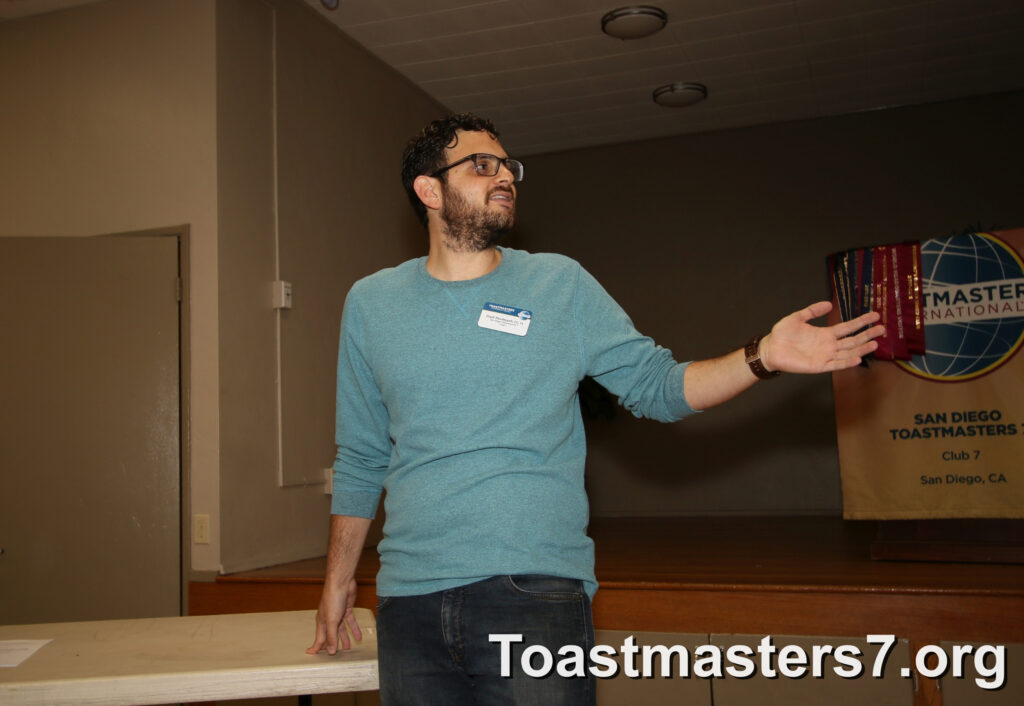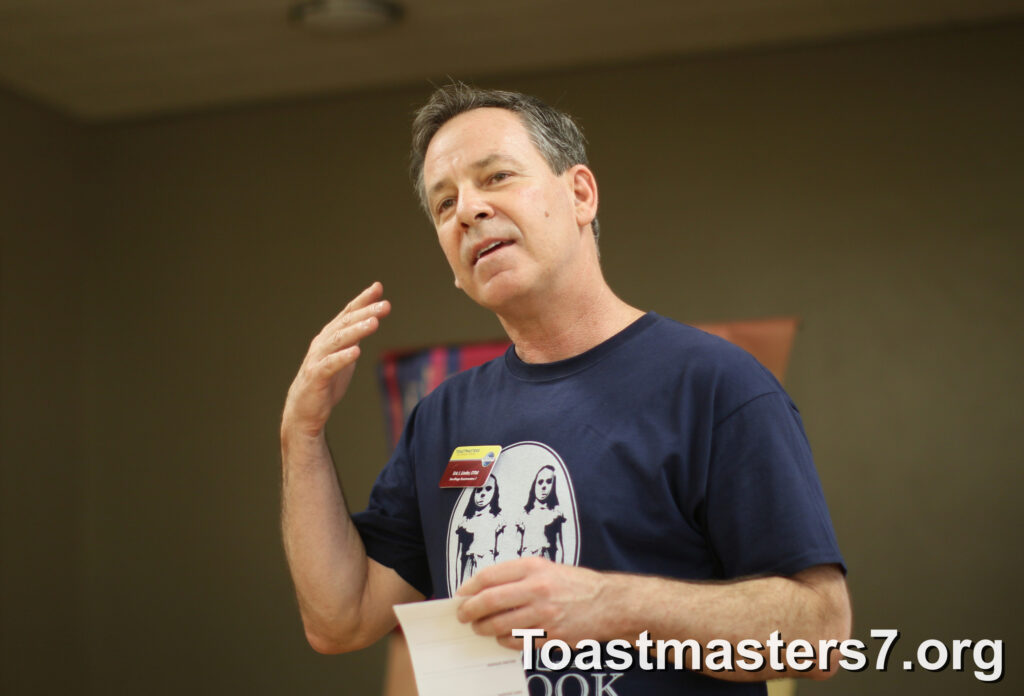Constant evaluation is the key to long-term, personal and professional growth. Why? Because constructive feedback is essential to improvement. Even if it can feel a little awkward, the benefits you receive from gathering meaningful and tangible feedback far outweigh any short-term discomfort.
Toastmasters facilitates a constructive feedback loop as an essential part of its educational program. If you truly want to improve your speaking and leadership skills, you must learn how to give and receive helpful evaluations. Here are some valuable tips on how to give and receive effective evaluation from seasoned evaluators at San Diego Toastmasters 7:
TIPS FOR THE EVALUATOR
The main purpose of the Evaluator is to provide constructive and encouraging feedback that helps the speaker improve his/her speaking skills and gain confidence.
Toastmasters International promotes the “sandwich technique” as its model for evaluations. Here’s how it works:
- State the positives of the speech
- Suggest an area or two for improvement
- Finish with another positive comment
Simple, encouraging, yet effective. This feedback style is also recommended for written audience feedback. If you find yourself acting as an Evaluator, remember to only evaluate areas the speaker has the power to change. Just because you personally don’t like a speech, doesn’t mean your opinion is warranted. Unless your criticism is productive, keep it to yourself.
Shadi Abudayyeh, seasoned member at San Diego Toastmasters 7, shared why Evaluator is his favorite role.

“By giving constant evaluations, I have become better at giving the most direct and straightforward advice. Being an Evaluator has helped me stay constantly focused during speeches, provide individualized feedback, and helped me become a better communicator,” Abudayyeh said.
It helps to remember the speaker you are evaluating likely spent hours (or even weeks!) preparing for a project. They deserve a meaningful and thoughtful evaluation. Here are some tips to help Evaluators provide the most value to the speaker:
Do your research. Chat with the speaker beforehand, find out which Pathways project he/she is presenting and look up the specific project objectives. Be sure to ask if there are any additional areas beyond the project evaluation form they want you to focus on.
Listen before you evaluate. DTM Chris Hammel, explains why he rarely takes notes during evaluations.

“Evaluation is effective if you hear the entire speech. Otherwise, you’re evaluating a speech the speaker didn’t give because you missed key parts while you were taking notes,” Hammel said.
Now, Hammel only takes notes on the key points the speaker lists in his/her introduction so he can monitor their chronology. That being said, evaluation is an art, not a science. Toastmasters International offers comprehensive resources to help guide speakers through the process, but don’t be afraid to try different strategies to find what works best for you.
Don’t tell someone what to do. When presenting constructive feedback, always preface your suggestion by saying, “In my opinion” or “I feel.” These statements will help the speaker feel less defensive because you’re allowing them to take your feedback with a grain of salt.
Customize your communication style. With experience, Abudayyeh has learned to tailor his evaluation style to each individual speaker to provide them with the most effective feedback for their development. In most clubs, it’s common for advanced speakers to prefer a direct approach while newer members generally respond better to an encouraging tone. However, if you’re unsure, don’t assume. A simple question posed to the speaker about his/her preferred evaluation style will help set you and the speaker up for success.
Speak with intention. Speakers can easily tell who took the time and effort to offer genuine and intentional feedback. They can also quickly tell who lacked attention and resorted to lazy observations. Remember, when Evaluators only share positive takeaways, they are usually doing more harm than good when it comes to the speaker’s long-term growth.
TIPS FOR THE EVALUATEE
Once a speaker finishes presenting, he/she has a moment to step back and relax. This is the waiting period when the audience members prepare written feedback and the evaluator presents a 2-3 minute evaluation. It can be an intimidating experience at first, but the club makes a concerted effort to ensure the speaker feels supported and encouraged. At San Diego Toastmasters 7, we take pride in creating a positive experience for all members and guests that walk through our doors.
Many new members, though nervous at the start, walk away with a strong feeling of encouragement and support after presenting their first personal speeches. Members at San Diego Toastmasters 7 have even been known to follow up via email after connecting with a story and go out of their way to acknowledge newcomers. San Diego Toastmasters 7 takes pride in itself as a place where members not only talk the talk, but walk the walk when it comes to valuing the experiences of others.
Speakers that practice humility and open themselves up to the evaluation process reap the rewards of the development and support the club offers.
Here are some tips to help speakers successfully navigate evaluations and utilize feedback for improvement:
Take it with a grain of salt. While it’s important to review all feedback, don’t feel obligated to absorb everything. Some nights you may walk away with 50+ slips of audience feedback, which can be overwhelming. It’s important to implement your own filtering process to identify the comments that are most valuable to you.
Pay attention to trends in audience feedback and suggestions from your mentor and other trusted speakers. If you receive the same piece of feedback on numerous occasions, this may be something worthy of greater exploration.
That said, do your best to avoid defensiveness if you disagree with your Evaluator’s feedback. Instead, ask for further clarification after the meeting. Hammel explained the evaluation process has helped him receive feedback in his personal life. Before Toastmasters, he would immediately react and become defensive when presented with constructive feedback. Now, he takes the time to assess the value of each point before responding.
“Evaluations have made me more approachable because people aren’t afraid of correcting me,” Hammel said.
Practice self-reflection. Most importantly, if you find yourself in the role of the speaker, be sure to take time to reflect on your speech. Some helpful questions to ask include:
How did I feel on stage?
Did I cover all the main points?
What parts of my speech went well?
What areas could have gone better?
This reflection process will help you identify the most valuable pieces of feedback that resonate with your own perspective. The more self-aware you become, the more effective you will be in your communication going forward.
Learn from others. Don’t wait until your next speech to make improvements. You can continue to learn by watching others! Gather inspiration from speeches you enjoy and take note of the feedback they receive when creating your next speech. Long-time member and DTM Eric Linder shared his take on evaluations.

“I learn how to improve my presentation skills at every meeting, whether or not I have a speaking role at one. During the evaluation section of the meeting, the Evaluators provide insightful suggestions to everyone on how to fine-tune and improve presentations,” Linder said.
As effective communicators and leaders, we need constructive feedback in order to enhance personal and professional growth. Without it, you run the risk of becoming complacent and stagnant. After all, a comfort zone is a beautiful place, but nothing ever grows there. Embrace your Toastmasters journey and Pathways education with an open mind and willingness to improve, and you’ll reap all the benefits it has to give you.
For further information on evaluation, Toastmasters International offers various resources including a more in-depth version of “The Art of Effective Evaluation”. Or you can reach out to the VP of Education at [email protected] for questions.

Meghan, thank you for a detailed and informative post about evaluations! Very helpful for new and seasoned members.
Thanks for the comment, Elaine! Evaluation is key 🙂